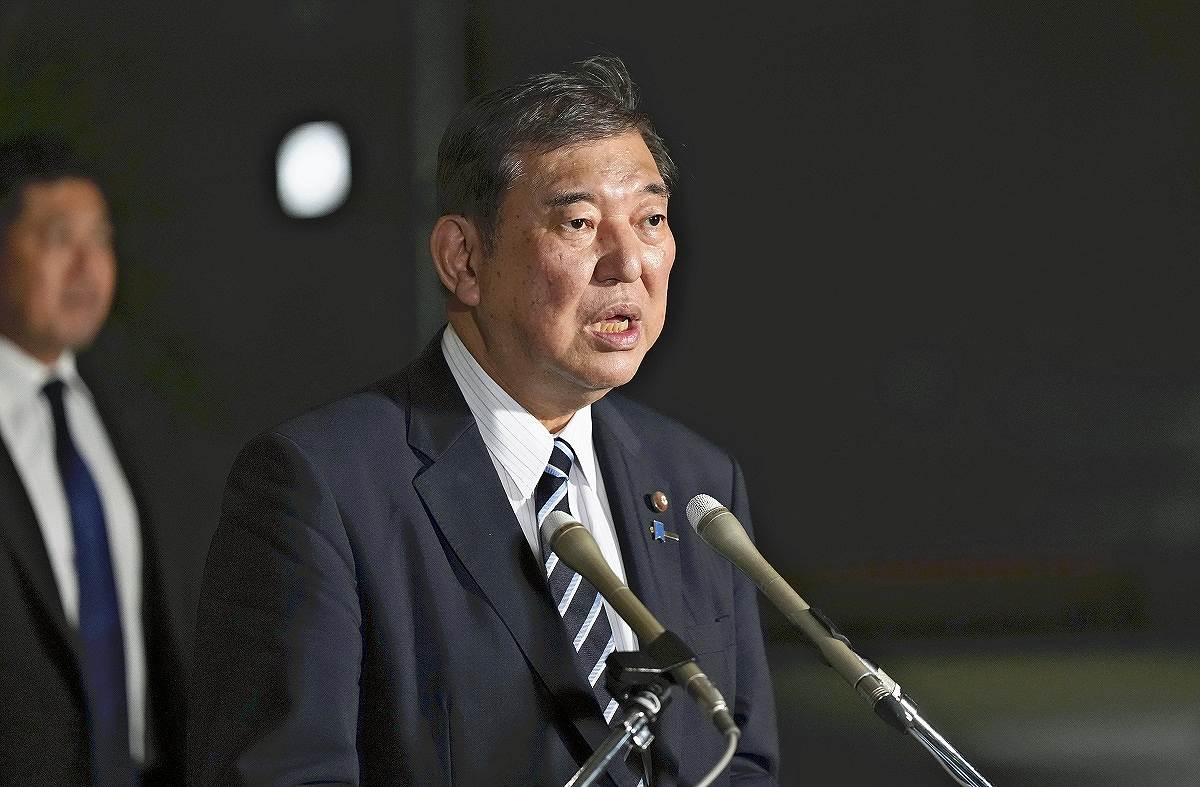Shigeru Ishiba Makes Safe Start in Promoting Japan-U.S. Relations; Foreign, Defense Ministers Cautious about New PM’s Visions

Prime Minister Shigeru Ishiba speaks to reporters at the Prime Minister’s Office in Tokyo on Wednesday.
14:43 JST, October 3, 2024
Prime Minister Shigeru Ishiba made a safe start in his promotion of Japan-U.S. relations by prioritizing building confidence during a telephone conversation with U.S. President Joe Biden. He avoided discussing his specific visions on foreign and security policies.
During the 15-minute conversation on Wednesday, Ishiba did not mention his signature idea of revising the Japan-U.S. Status of Forces Agreement or the creation of an “Asian version of the North Atlantic Treaty Organization.”
After mentioning the efforts of the Cabinet of former Prime Minister Fumio Kishida in strengthening the Japan-U.S. alliance, Ishiba told Biden that he would like to adopt its policies and further enhance the alliance.
Ishiba told reporters at the Prime Minister’s Office after the talks that he had previously met Biden, then the U.S. vice president, in 2014, when he was secretary general of the Liberal Democratic Party.
“I hadn’t spoken to him since, but this conversation was very good,” he said.
Ishiba emphasized his stance of prioritizing relations with the United States during the talks because he felt it was important to “allay any U.S. concerns at the first opportunity,” according to a Foreign Ministry official.
According to a White House announcement, Biden said during the conversation that he looked forward to working closely with Ishiba. They agreed to deepen cooperation through frameworks such as the Japan-U.S.-South Korea and Japan-U.S.- Philippines, the announcement said.
It is believed that the United States was aiming to impress on the new prime minister the importance of multilateral cooperation between existing allied and friendly countries.
Foreign, defense ministers cautious
Foreign Minister Takeshi Iwaya said that the creation of an Asian version of NATO, as proposed by Ishiba, is an issue to be discussed in medium- to long-term.
“It would be difficult to immediately establish an entity in Asia that would assume mutual defense obligations,” he said at a press conference Wednesday.
Many said that Ishiba’s vision of creating such an entity would require a constitutional amendment to allow the full use of the right of collective self-defense, which would make it difficult to realize.
Regarding Ishiba’s other vision — the creation of a training base for the Self-Defense Forces in the United States — Defense Minister Gen Nakatani, at a press conference Wednesday, only said that “a wide range of options need to be considered.”
Related Tags
Top Articles in Politics
-

Japan PM Takaichi’s Cabinet Resigns en Masse
-

Sanae Takaichi Elected Prime Minister of Japan; Keeps All Cabinet Appointees from Previous Term
-

Japan’s Govt to Submit Road Map for Growth Strategy in March, PM Takaichi to Announce in Upcoming Policy Speech
-

LDP Wins Historic Landslide Victory
-

LDP Wins Landslide Victory, Secures Single-party Majority; Ruling Coalition with JIP Poised to Secure Over 300 seats (UPDATE 1)
JN ACCESS RANKING
-

Producer Behind Pop Group XG Arrested for Cocaine Possession
-

Japan PM Takaichi’s Cabinet Resigns en Masse
-

Japan Institute to Use Domestic Commercial Optical Lattice Clock to Set Japan Standard Time
-

Man Infected with Measles Reportedly Dined at Restaurant in Tokyo Station
-

Israeli Ambassador to Japan Speaks about Japan’s Role in the Reconstruction of Gaza





















